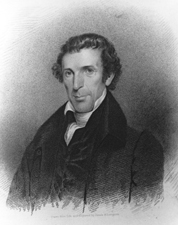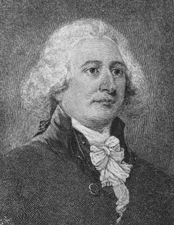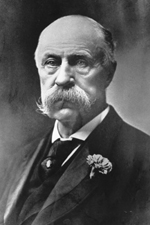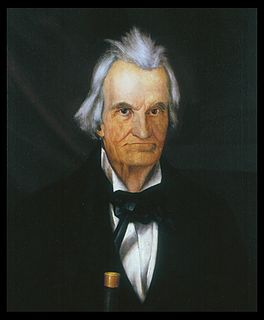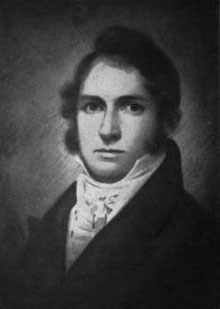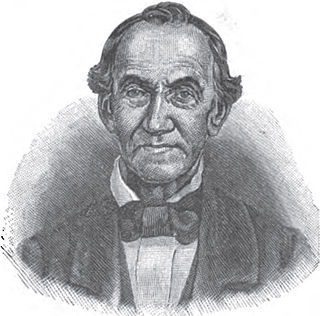| Samuel McKee | |
|---|---|
| Member of the U.S.HouseofRepresentatives from Kentucky's 7th district 2nd district (1809–1813) | |
| In office 1809–1817 | |
| Personal details | |
| Born | October 13, 1774 near Lexington, Virginia |
| Died | October 16, 1826 (aged 52) |
| Political party | Democratic-Republican |
| Alma mater | Liberty Hall Academy |
| Occupation | Attorney |

Samuel McKee (October 13, 1774 – October 16, 1826) was a U.S. Representative from Kentucky.

The United States House of Representatives is the lower chamber of the United States Congress, the Senate being the upper chamber. Together they comprise the legislature of the United States.

Kentucky, officially the Commonwealth of Kentucky, is a state located in the east south-central region of the United States. Although styled as the "State of Kentucky" in the law creating it, (because in Kentucky's first constitution, the name state was used) Kentucky is one of four U.S. states constituted as a commonwealth. Originally a part of Virginia, in 1792 Kentucky became the 15th state to join the Union. Kentucky is the 37th most extensive and the 26th most populous of the 50 United States.
Born near Lexington, Augusta (now Rockbridge) County, Virginia, McKee was graduated from Liberty Hall Academy (now Washington and Lee University), Lexington, Virginia, in 1794. He studied law. He was admitted to the bar in 1800 and commenced practice in Somerset, Kentucky. He served as surveyor of Pulaski County. He moved to Lancaster, Kentucky, in 1807 and continued the practice of law. He served as member of the State house of representatives 1802–1808.
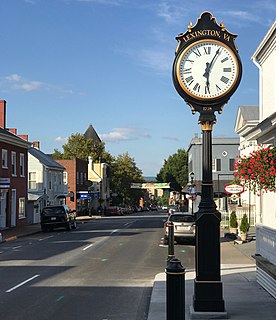
Lexington is an independent city in the Commonwealth of Virginia in the United States. At the 2010 census, the population was 7,042. It is the county seat of Rockbridge County, although the two are separate jurisdictions. The Bureau of Economic Analysis combines the city of Lexington with Rockbridge County for statistical purposes. Lexington is about 57 miles (92 km) east of the West Virginia border and is about 50 miles (80 km) north of Roanoke, Virginia. It was first settled in 1777.
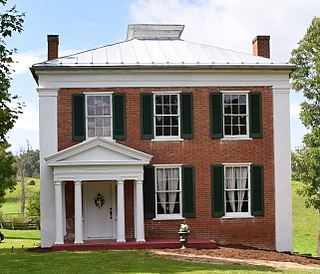
Rockbridge County is a county located in the Commonwealth of Virginia. As of the 2010 census, the population was 22,307. Its county seat is Lexington. The independent cities of Buena Vista (6,680) and Lexington (7,170) are both enclaved within the county's geographical borders.
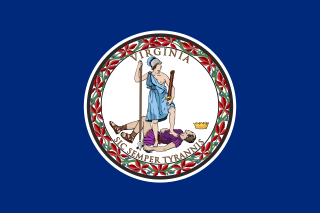
Virginia, officially the Commonwealth of Virginia, is a state in the Southeastern and Mid-Atlantic regions of the United States located between the Atlantic Coast and the Appalachian Mountains. Virginia is nicknamed the "Old Dominion" due to its status as the first English colonial possession established in mainland North America and "Mother of Presidents" because eight U.S. presidents were born there, more than any other state. The geography and climate of the Commonwealth are shaped by the Blue Ridge Mountains and the Chesapeake Bay, which provide habitat for much of its flora and fauna. The capital of the Commonwealth is Richmond; Virginia Beach is the most populous city, and Fairfax County is the most populous political subdivision. The Commonwealth's estimated population as of 2017 is over 8.4 million.
McKee was elected as a Democratic-Republican to the Eleventh and to the three succeeding Congresses (March 4, 1809 – March 3, 1817). He served as chairman of the Committee on Public Lands (Thirteenth Congress). He served in the War of 1812 on the staff of General (and later President) William Henry Harrison. Samuel McKee was a model of "imbedded oversight" by the Congress of the Executive Branch in the early 19th century. As a Congressman from Kentucky, he participated in formulating, drafting and introducing in the Congress the Articles of War declaring war on Great Britain in 1812. Then, during the summer recess, he enlisted as a private, serving on the staff of General William Henry Harrison at, among other places, the Battle of the Thames. Thus, he was able to provide feedback to his Congressional allies, including Henry Clay and John C. Calhoun. After the war, he resumed the practice of his profession in Lancaster. He was a lifelong political ally and close personal friend of Henry Clay, and of John C. Calhoun. Family records indicate there was a long-running series of letters exchanged between the three on many of the most critical political issues of the day. Although the whereabouts of those to McKee are unknown, those of his to Clay and Calhoun may be archived in their papers. He was a founding trustee of Centre College of Kentucky in Danville. He was appointed by President Monroe as a member of the commission to clear the Ohio and Mississippi Rivers of obstructions and served until his death in Hickman County, Kentucky, on October 16, 1826. He was interred in Frankfort Cemetery, Frankfort, Kentucky.
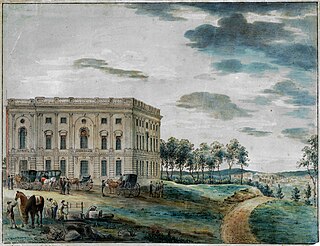
The Eleventh United States Congress was a meeting of the legislative branch of the United States federal government, consisting of the United States Senate and the United States House of Representatives. It met in Washington, D.C. from March 4, 1809 to March 4, 1811, during the first two years of James Madison's presidency. The apportionment of seats in the House of Representatives was based on the Second Census of the United States in 1800. Both chambers had a Democratic-Republican majority.

The U.S. House Committee on Natural Resources or Natural Resources Committee is a Congressional committee of the United States House of Representatives. Originally called the Committee on Interior and Insular Affairs (1951), the name was changed to the Committee on Natural Resources in 1991. The name was shortened to the Committee on Resources in 1995 by the new Chairman, Don Young. Following the Democratic takeover of the House of Representatives in 2006, the name of the committee was changed back to its title used between 1991 and 1995.

The Thirteenth United States Congress was a meeting of the legislative branch of the United States federal government, consisting of the United States Senate and the United States House of Representatives. It met in Washington, D.C. from March 4, 1813, to March 4, 1815, during the fifth and sixth years of James Madison's presidency. The apportionment of seats in the House of Representatives was based on the Third Census of the United States in 1810. Both chambers had a Democratic-Republican majority. The first two sessions were held at the Capitol building while the third, convened after the Burning of Washington, took place in the First Patent Building.
He was married on June 25, 1807 to Martha "Patsy" Robertson (1788–1848) in Lancaster, Garrard County, Kentucky. Martha was the daughter of Alexander Robertson, an early pioneer in the Harrodsburg, Kentucky area, a delegate to the Virginia House of Delegates to ratify the US Constitution, and a sister and sister-in-law of two other men who would rise to prominence in state and national politics.

The Virginia House of Delegates is one of two parts in the Virginia General Assembly, the other being the Senate of Virginia. It has 100 members elected for terms of two years; unlike most states, these elections take place during odd-numbered years. The House is presided over by the Speaker of the House, who is elected from among the House membership by the Delegates. The Speaker is usually a member of the majority party and, as Speaker, becomes the most powerful member of the House. The House shares legislative power with the Senate of Virginia, the upper house of the Virginia General Assembly. The House of Delegates is the modern-day successor to the Virginia House of Burgesses, which first met at Jamestown in 1619. The House is divided into Democratic and Republican caucuses. In addition to the Speaker, there is a majority leader, majority caucus chair, minority leader, minority caucus chair, and the chairs of the several committees of the House.
Martha's brother, George Robertson (1790–1874), studied law under McKee, succeeded McKee in the Congress (1817–1821), and served as Chief Justice of Kentucky (1829–1843 and 1870–1871). He also declined four cabinet offers and two Supreme Court nominations. McKee's brother-in-law was Robert Perkins Letcher (1788–1861) succeeded Robertson in the US Congress, and later served as the fifteenth Governor of Kentucky (1840–1844) and Ambassador to Mexico (1849–1852). At various times in their lives each of these three lived in the same house in Lancaster, Kentucky, which became known as "The House of the Three Congressmen".

George Robertson was a U.S. Representative from Kentucky.
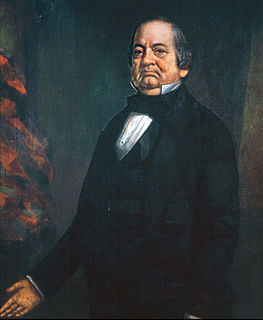
Robert Perkins Letcher was a politician and lawyer from the US state of Kentucky. He served as a U.S. Representative, Minister to Mexico, and the 15th Governor of Kentucky. He also served in the Kentucky General Assembly where he was Speaker of the House in 1837 and 1838. A strong supporter of the Whig Party, he was a friend of Henry Clay and John J. Crittenden.

The Governor of the Commonwealth of Kentucky is the head of the executive branch of government in the Commonwealth of Kentucky. Fifty-seven men and one woman have served as Governor of Kentucky. The governor's term is four years in length; since 1992, incumbents have been able to seek re-election once before becoming ineligible for four years. Throughout the state's history, four men have served two non-consecutive terms as governor, and two others have served two consecutive terms. Kentucky is one of only five U.S. states that hold gubernatorial elections in odd-numbered years immediately before the United States Presidential Election. The current governor is Matt Bevin, who was first elected in 2015.

